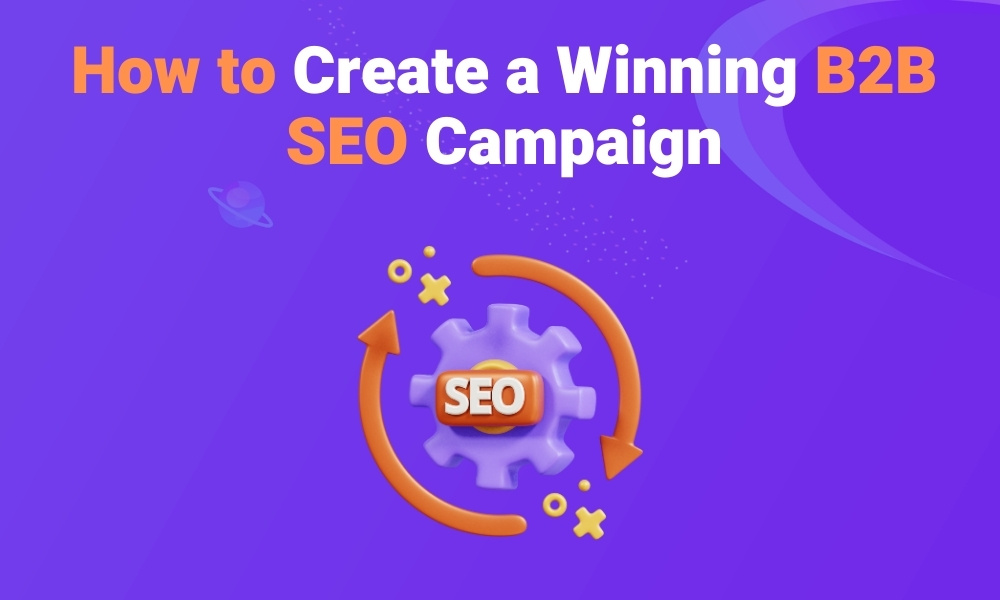If you want to increase your online presence and generate high-quality leads, a winning B2B SEO campaign is important. During B2C strategies, where the focus is on reaching a broad audience, B2B SEO requires a targeted approach, often aimed at decision-makers and influencers within companies.

The Fundamentals of B2B SEO
The main objective of B2B SEO is to optimize a business website to rank higher on search engine results pages (SERPs) and target other companies as clients. B2B SEO focuses on decision-makers within organizations that follow longer and more complex purchasing processes. This process involves multiple stakeholders and extensive research. Therefore, a B2B SEO strategy must provide informative and authoritative content that meets decision-maker’s needs at every step.
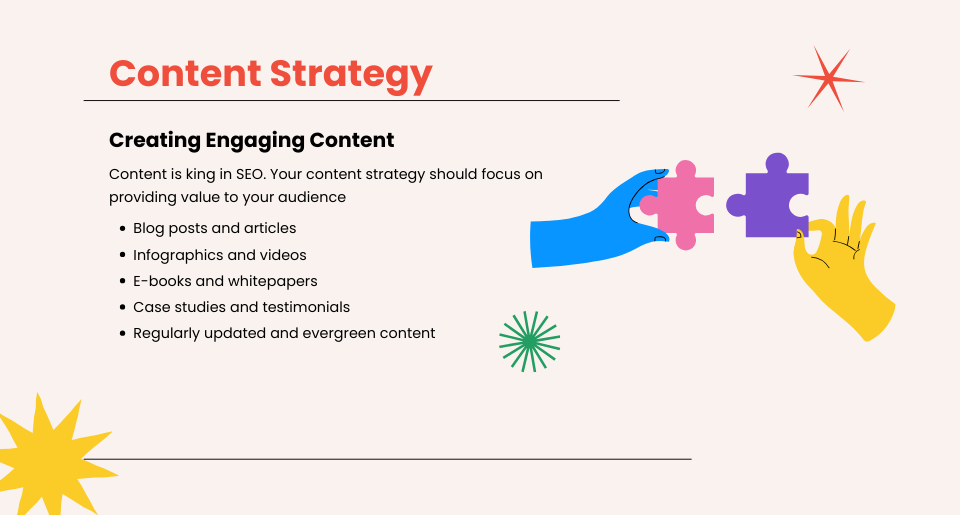
Setting Clear Goals for Your B2B SEO Campaign
Setting clear and achievable goals is the foundation of a successful B2B SEO campaign. B2B SEO campaign vision is to nurture leads during longer sales cycles. Therefore, it’s essential to align your SEO objectives with broader business objectives, such as lead generation, customer retention, and brand recognition.
To measure the effectiveness or success of your B2B SEO campaign, create KPIs such as organic traffic growth, lead quality, form submissions, and the number of MQLs (marketing qualified leads) generated through the channel. Tracking conversation rates for high-value operations such as document downloads or requesting a demo can also provide you with information about the effectiveness of your strategy.

Example SEO Goals:
- Increase organic traffic by 40% in six months.
- Generate 20 qualified leads every month from organic search.
- Achieve first-page rankings for 3 high-intent keywords.
Keyword Research and Target Audience
Keyword research depends on B2B SEO campaigns. B2B keyword research should be more strategic. It addresses the unique needs and issues of business decision-makers. High-intent keywords that reflect multiple steps in a buyer’s day are critical to reaching the right audience at the right time.

Types of Keywords for B2B SEO:
- High-intent keywords: Focus on phrases that indicate buyers are searching for a solution, such as “best B2B software provider” or “enterprise content management system.
- Long-Term Keywords: people always look for very specific solutions. Segmenting long-term keywords like “custom CRM solutions for small businesses” can help you reach a more qualified audience.
- Industry-specific keywords: It Includes industry-specific terminology and sector-specific phrases used by decision-makers during their research.
Tools for Keyword Research:
To improve your keyword research Use a tool like SEMrush, Ahrefs, or Google Keyword Planner to identify related terms and check your search volume and consistency. These references help you find keywords that fit your audience’s information needs at different stages of the decision-making process.
On-Page SEO Optimization
Once you’ve identified the right keywords, the next step is to implement on-page SEO optimization across your website. During On-page SEO, we need to optimize individual web pages to improve their rankings and drive relevant organic traffic. Your content must be structured in a way that caters to both search engines and human decision-makers.
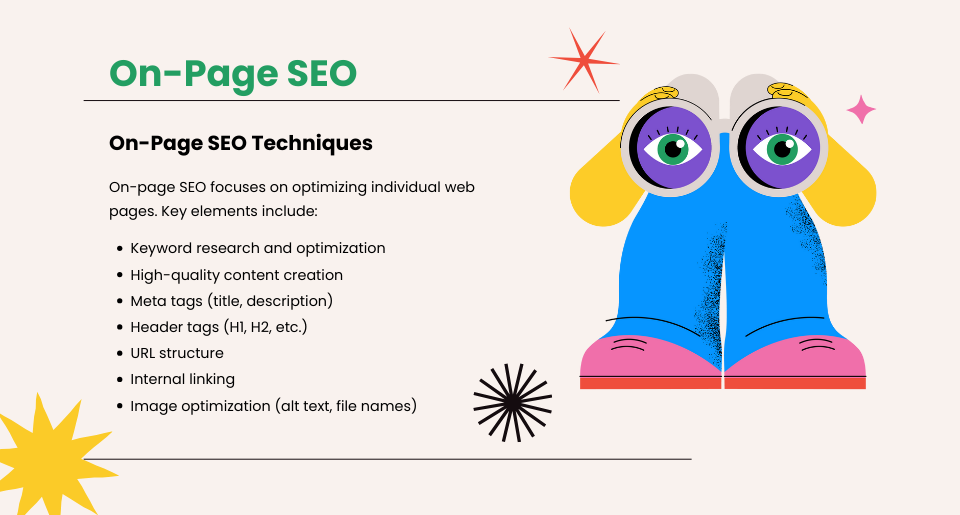
Key Elements of On-Page SEO:
- Title Tags & Meta Descriptions:
We need to write title tags and meta descriptions related to primary keywords. These basic but important elements are the first things potential clients see in search results. - Header Tags (H1, H2, H3):
You should properly structure header tags to help search engines understand the content hierarchy of your pages. Use primary or secondary keywords in your H1 and H2 tags to improve SEO performance. - Content Optimization:
Write high-quality and relevant content that provides valuable information and insights to viewers. This could be in the form of detailed blog posts. Your content should be well-organized and written by professionals to address the key pain points of your audience. - Internal Linking:
You should Connect your pages through internal links to guide visitors through your website. This helps distribute and encourages visitors to engage with more relevant content. - Mobile Optimization and Page Speed:
Your website must be fully optimized for mobile devices. Google also considers page speed to rank your website content, so make sure your site loads quickly on mobile too.
Content Marketing Strategy
A well-executed and relevant content marketing strategy is very important for a successful B2B SEO campaign. B2B buyers are more research-driven, and we need to provide them with valuable and educational content that solves their specific pain points.
Key Components of a B2B Content Strategy:
- Understand the Buyer’s Journey:
A buyer goes through multiple stages before making a purchase decision is made. Your content should be written in a way to guides potential clients effectively at every step. In the Awareness and information stage, write and post content such as blog posts, industry insights, and educational guides. in the decision-making stage, provide product demos, and conduct webinars to help buyers make informed decisions. - Repurposing Content Across Channels:
Once you have created valuable content, repurpose it and post it across multiple channels such as social media, newsletters, and email marketing. This increases the chances of reaching a wider audience. - Content Calendar:
Plan your content production wisely which should reflect your SEO goals and target keywords. When the content is ready for publishing, publish it according to your already-made content strategy.
Off-Page SEO and Link Building
Off-page SEO is as important as well as on-page SEO to increase your website’s ranking chances in the eyes of search engines. one of the most important off-page SEO strategies is link building. For B2B SEO, gaining high-quality backlinks can significantly increase your website’s search rankings.
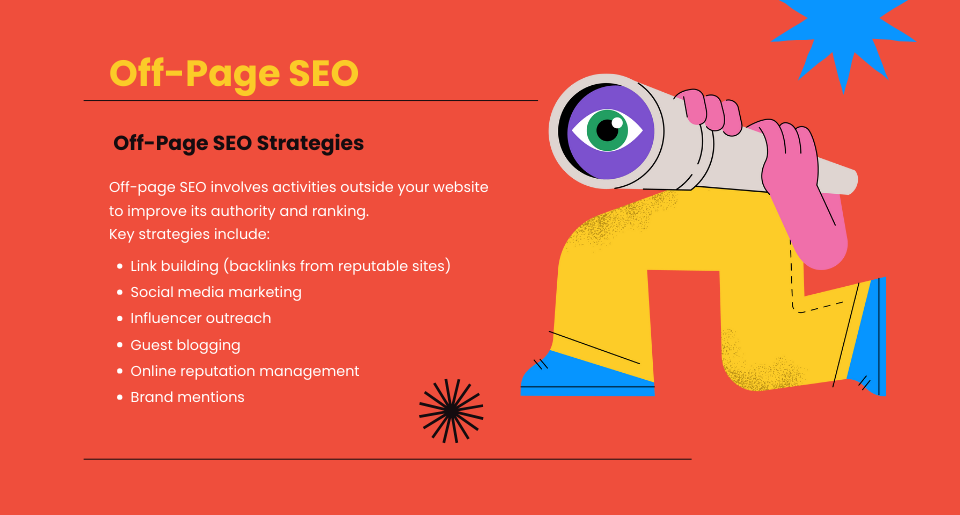
Key Off-Page SEO Tactics for B2B:
- Earn Quality Backlinks:
To get quality backlinks, create high-quality shareable content, such as blogs, whitepapers, or case studies, that other sites consider valuable.
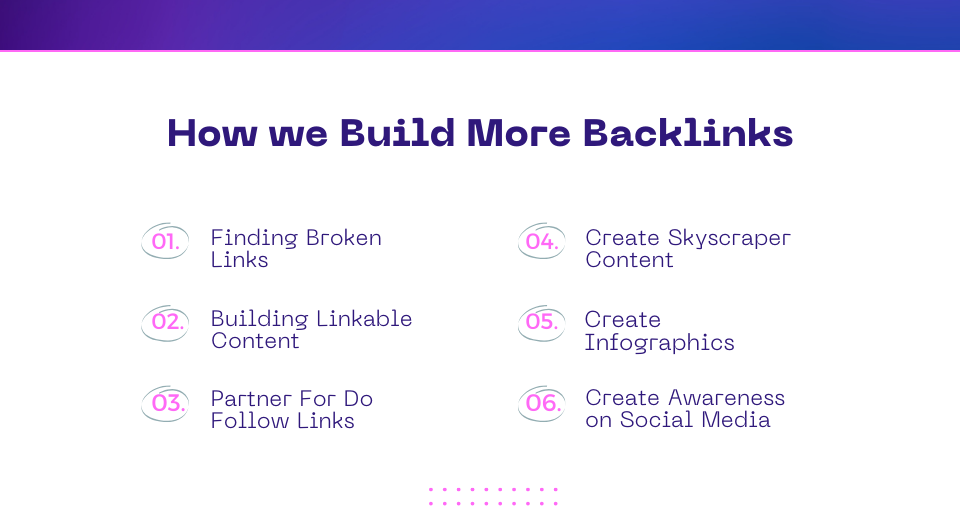
- Leverage Industry Connections:
Public relations and industry networks can jumpstart your B2B link-building efforts. Participation in industry activities and receiving coverage on trusted relevant websites can help increase the authority of your website. - Directory Listings and Citations:
Listing your company in relevant directories or referral sites can improve your online presence and generate more referral traffic. Make sure you are listed in business directories specific to your niche. - Social Sharing and Engagement:
Although social media is not a direct ranking factor, sharing your content on social media platforms like LinkedIn or Twitter can lead to more visibility and backlink opportunities.
Measuring and Analyzing SEO Performance
To ensure your B2B SEO campaign is successful It’s important to continually monitor and analyze results. SEO is a long-term strategy. So regularly evaluating key numbers can help you identify what’s working and where improvements are needed. Data-driven insights are key to optimizing your efforts and achieving sustainable growth.
Key Metrics to Track:
- Organic Traffic Growth:
One of the main goals of SEO is to increase organic traffic. Use tools like Google Analytics 4 and Google Search Console to track your organic traffic growth over time. Know which pages generate the most traffic and adjust your strategy accordingly. - Keyword Rankings:
Track your keywords regularly to see if your targetted keywords are climbing in the SERPs. Companies like SEMrush, Ahrefs, or Moz can help you understand how well your site is performing for the right keywords. - Bounce Rate and User Engagement:
If users access your site and see it quickly It might indicate that your content or user experience isn’t meeting their expectations. Monitoring rejection rates and user behavior on your home page can help you adjust your content to more effectively attract visitors. - Backlink Profile:
Check your backlink profile regularly to see the quality and quantity of links you post to your site. Tools like Ahrefs or Majestic, allow us to track new backlinks and identify new link-building opportunities.
Conclusion
Successful B2B SEO campaigns require a strategic approach that recognizes the unique complexities of the B2B buying process by creating content that speaks directly to decision-makers. Optimizing for relevant keywords and focusing on providing relevant and valuable information. Businesses can improve visibility and reliability. SEO efforts tailored to meet the unique needs of each stage of the buyer’s journey help pave the way for more sales and possible conversions and ultimately drive sustainable business growth.

